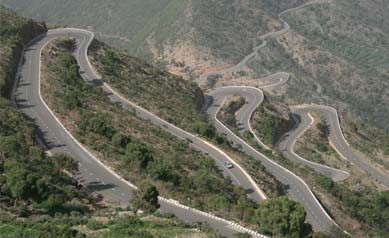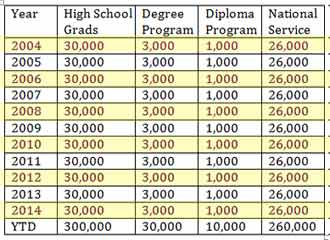Political Pluralism Eritrean Style

Somewhere in Northern Eritrea, by the islands of Scylla, Isaias Afwerki was crowned Emperor of Eritrea. He flew over to Southern Eritrea, by the banks of River Charybdis, to swear in the president, also named Isaias Afwerki. The emperor and the president have complete separation of powers: the president, as head of government, runs the country; while the Emperor, as head of state, makes occasional appearances on State TV mostly to praise the president and occasionally harshly criticize the head of government and his cabinet. Of course, it is one and the same guy but having an Emperor criticizing a President and his government, but being powerless to do anything about firing him, is Eritrea’s version of divided government, our form of political pluralism–ብዙሕነት! This year, the Emperor criticized the President’s handling of Eritrea’s “national service” policy and his 1997 embrace of a naive constitution. That’s what Al Nahda will focus on and, note in passing, the strange bedfellows the Eritrean opposition make with the Emperor and… what exactly is Isaiasism anyway?
Introduction
In prior end-of-year interviews, Emperor Isaias Afwerki had severely criticized President Isaias Afwerki’s execution of the nation’s education policies; pace of national development particularly in Western Eritrea; lack of exploitation of fisheries and the president’s overall naiveté on foreign relations.
A not inconsiderable number of Eritreans are sympathetic to the poor emperor because he just doesn’t have colleagues and subordinates who operate at his superior level– መሳርሕቲ እንድዩ ስኢኑ!
This year, the Emperor was asked 11 questions: four of the questions dealt with Eritrea’s place in the World (global, regional); three dealt with Eritrea’s human resources (the youth in National Service; the old in People’s Army; building capacity); two with governing style and vision (President Isaias Afwerki’s onsite management, and his 3-5 year vision for Eritrea); and one dealt with restraining the power of the government (the death sentence on the 1997 constitution and the one presumably replacing it): one was the usual Western Union question (any messages you want to pass on?) Because of the rambling nature of his communication style, it is next to impossible to summarize what the Emperor says (even his official website, shabait, always manages to screw it up.) A better alternative might be to provide a glimpse into Isaiasism or his worldview.
Isaiasism: The World According To Emperor Isaias Afwerki
Isaias Afwerki, World Citizen, is angry at the unjustness of the World Order and its undisputed boss, the United States Administration, and determined to do something about this anger! He is angrier and more determined to do something about the unjustness of the World Order than most Eritreans are about the unjustness of Eritrean Order and its undisputed boss.
Isaias Afwerki sees the world and he sees one that is divided between the haves and have-nots; between the fortunate and unfortunate; between those given opportunities and those denied. It is a world without social justice or economic justice. This, he knows, is not new: it is as old as history itself: the only difference being that the polarization now is extreme. The United States is on the side of the 1% against the 99%–including within its own territories—and, in Africa, it has designated regional musclemen to enforce its unjust vision.
This is pretty conventional view, one that many Eritreans would agree with His Excellency (and discuss in coffee shops all over the world), but this is where things get interesting: Eritrea will stand, even if it has to stand alone, to defy this hegemony. Really? Apparently. Why would we do something that is clearly suicidal? Because we did it for 30 years during the Armed Struggle. But at what price? Well, nothing is free: we will pay for it, and targeting Eritrea with policies designed to empty it out of its productive youth is one manifestation; the 2009 sanctions against Eritrea are one such manifestation.
You accept this worldview, and you accept Eritrea’s “specialness” to defy it, and the World’s (US/UN/EU and their “servants”) determination to bring Eritrea in line by waging all sorts of war (psychological, economic, military), then everything falls right in place. The tens of thousands of Eritreans who have been made to disappear in Eritrean prisons? They took sides in this “war” against Eritrea and they lost. Ethiopia’s occasional declaration that if there is any act of terrorism against it, it will go after the source in Eritrea? It is just trying to make the case to a weary UN that the sanctions against Eritrea should remain in place. The massive exile of Eritreans? Targeted by enemies. Eritrea’s diplomatic isolation? What isolation: we have excellent relationship in the region, except Ethiopia and those temporarily misled by Ethiopia.
Justice, to Isaias Afwerki, means equality. Even if it is equality in misery. The old people had to see their harvest ruined because President Isaias Afwerki sent them for military drills? The Emperor is fine with this: why should only those who have been in the front lines for 15 years[1] be the sole citizens to be in the frontlines? Are they cursed? But emperor: there is no electricity in Asmara and it is our capital city? So! There are places in Eritrea that have no running water.
Work is its own reward. Don’t expect Emperor Isaias Afwerki to give you happy lullabies of better days ahead. Well, sure, occasionally he will say that we have shifted to a higher gear, or next year is our transition year, the take off year, but mostly it is a message of austerity. These are the Sacrifice Years. The Investment Years. For Decades, maybe. Don’t be asking Emperor Isaias Afwerki about three year plans and five year visions: don’t ask him about gold dividends and compensations and pensions. He literally has to be in the time and the space to see things: ኣነ ካብ ክዉንነት ርሒቁ ክሓስብ ዝክእል ሓንጎል የብለይን. He, unlike you, lives in the Real World—one where he had to spend over 200 million dollars to import fuel for your damn tractors, you ingrates!
The Problem With Isaiasism
As with all “isms”, Isaiasim suffers from the same things all ideologies do: rigidity. An ideology is a “system of ideas, whether consciously organized or not which explains various aspects of life, justifies the social structure, and provides a ready-made meaning for human existence.”[2] Ideologues see the world from an “us vs them” prism and everything that doesn’t neatly fit this divide is either ignored as an anomaly or disfigured to fit into either polarity.
Isaiasism has an extreme interpretation of ክዉንነት (reality), so austere and so selective about what it chooses to see, it verges on the delusional. As mentioned, of the 11 questions asked, three deal with Human Resources issues, and that’s where the focus of this article will be—as it exemplifies what happens to a country that has power concentrated so much in one man that he finds it necessary to split himself into two personalities: an emperor and a president.
The interviewer asks his boss: “…do we have the human and material resources to deliver on all the big projects you have outlined?” Isaias Afwerki’s answer on how to leverage human resources is the kind that would make any management consultant proud…until you consider one stunning statistic that the president completely ignores. Let me paraphrase what he is saying; but if you want to go to the source, I have chopped the video (it is 6 minutes long)[3]
“How do you develop human resources? You motivate and train people. They aquire skills, knowledge and, over time, experience. You add technology and you set a standard for excellence: a system that demands high quality from productive people. This creates, over time, a snowball effect. You build capacity based on quality and productivity of people: but you must be able to sustain the momentum. Don’t be fooled by what you see among the idle: this is actually happening; if you want to see the whole picture, take a look at the quality of life of people in the cities and rural area, the productive sector of our society that is making qualitative change, measured in size…is making dynamic change and that is great wealth.”
Now, let’s consider this piece of crucial data that the Emperor left out from his analysis.
Since 2004, the Sawa High School Completion School has been graduating, on average, about 30,000 students per year and sitting them for the College Entrance Exam. Of these, about 10% or 3,000, get good enough grades to be admitted to an academic college. Another 1,000 qualify for diploma/certificate (vocational) schools. The rest, 26,000 youth, are immediately absorbed into the National Service.
 Let’s analyze each number to test the validity that over time there has been a “snowball effect” and capacity building:
Let’s analyze each number to test the validity that over time there has been a “snowball effect” and capacity building:
- Those who are admitted to academic colleges and vocational schools will have one employer waiting for them: the government. This is because there is no private sector in Eritrea. And since the government is a terrible employer—low wages, low working conditions, no workers rights–they will be plotting and scheming to get out of the country and they have been.
- Those who are recruited to military service, the 26,000 per year, immediately realize that this is a dead-end because what awaits them after the military service is back-breaking work for low wages, low working conditions, (unsafe) and, again, no worker’s rights: no power to organize and demand rights–indefinitely. Just be a drone until you die. They will be plotting and scheming to get out of the country, and they have been.
- Over time, the distinction between those who have good enough grades to be admitted to college and those who don’t has become so meaningless that Eritrean youth are leaving the country BEFORE they even get their test results (which are announced in September, the beginning of the school year.) Refer to Gedab News on the story of Henok Mengesteab and Samuel Yonas, part of the 13 youth who were gunned down as they were attempting to leave the country in September BEFORE they even learned what their grades were.
- Even more disturbingly, for a country that wants to see gender-equality, because education is now seen as militarization followed by a dead-end career, female youth consider marriage-after-high-school as having higher potential than career-after-high-school.
- This DOES have a “snowball effect”, but not in the manner Isaias Afwerki intends. If people see secondary education as useless, they are also likely to see primary education as useless. According to the 2014 MDG Africa report, Eritrea is one of four countries (the others being all war-torn), who have actually seen a worsening of the gender gap at the primary education level.
- More “snowball effect”: as junior students and even elementary students (!) come to realize that their older brothers and sisters see no hope and no future in the country, they start escaping from the country at shockingly younger and younger ages.
The armed forces can’t absorb that many people (unless we want a million-man army) so, the youth who haven’t left the country have decided to demobilize themselves and refuse to enlist. In the interview, Isaias Afwerki concedes (casually) that a “not insignificant number” of Eritrean youth are just wasting away their lives in the streets and have been for years! Where will they go to get their lives back? And therefore, what will be done about it? Nothing. Nothing will change.
Why? Because Isaiasism says that all other options are worse: you can’t have a private sector that employs them because this widens the polarization between the Haves and Have Nots. You can’t have a professional army of volunteers because that widens the polarization between the army and the civilian. You can’t have an orderly exit-visa process because that widens the polarization between those with opportunities and those without. And if the employable, the professional army and those who will get entry visas to foreign lands are disproportionately urban-dwellers, Christians, highlanders, why then that must be avoided at all cost so we will just have national atrophy instead! Or worse, we will force them to take extreme measures to leave the nation in alarming rates, which we will then blame on foreigners.
Isaiasim also doesn’t consider the generational divide and the attitude of globalization on Millennials. In fact, in the interview, Isaias says he doesn’t even believe the concept of globalization by which he means, I think, that its impact is overstated. I don’t understand this because those of Isaias’s generation, now in their 60s and 70s, know that when they were in their 20s, the possibility of moving to distant lands—Europe, Americas—was remote. Now, it is commonplace.
The problem with Isaias is that his “realism” is based on a rigid doctrine: he is an ideologue. This observation was made by one the most astute observers of Eritrea, Robert D. Kaplan, who wrote[4] this about him in 2003:
I worried that Afewerki, like many other realists, is obsessed with everything that could go wrong in his country rather than with what could go right. True realism requires a dose of idealism and optimism, or else policy becomes immobilized. And that might be Afewerki’s problem. He seemed more comfortable when I first met him, in a state of wartime emergency, than he does now, in a state of peacetime possibility. He analyzes brilliantly what he knows, but he gives in to paranoia about what he doesn’t know. He did not seem to understand that U.S. foreign policy is often a synthesis of what the State and Defense Departments are comfortable with, and that therefore Foggy Bottom alone cannot be blamed for Eritrea’s image problems in the United States.
Strange Bedfellows: Isaias Afwerki & The Opposition
As he promised in his May 24, 2014 address, Isaias Afwerki is killing the 1997 Ratified constitution. For a long time, he had calculated that he can say that the ratified constitution has no implementation date and therefore it doesn’t exist. To those of us who used to call for a legal means to suspend the constitution by having the National Assembly declare a State of Emergency (ሕጂ እንታይ ይብሉ ኣለዉ ኻልእ ነገር እዩ, he says), he has an answer: well, declared or not, we were in a state of emergency. Now he has closed the final loophole and said tgushtetey (my bad!) it doesn’t exist. Gegezakhum Khidu: Hawi Agwagudu… But what kind of Hawi?
Besides, it is not that he hadn’t given us his rationale for it two years ago. Through his two spokespersons, Asamnew Ewnetun and Aradom Fedai Haqi[5], he said that he had changed:
“It is inconceivable that the personality of a leader, especially a young revolutionary leader, will remain unchanged for decades in spite of inexorable changes, problems and ordeals that are integral components of any revolutionary struggle. His training in revolutionary theory must have molded practice, but experience too must have molded theory. To this are added the vagaries and vicissitudes of struggle as well as relations between, and within, parties and groups. This will have had impacts not only on the development of skills but also on his character.”
To put it bluntly, the 1997 Constitution was drafted between 1995 and 1996, when President Isaias Afwerki was one of the African Renaissance Leaders, according to the US. It takes twenty years to understand what a New World Order looks like, he explains: the one we are in, the Unipolar World, took shape in 1989 and Isaias Afwerki learned from “the vagaries and vicissitudes of struggle as well as relations between, and within, parties and groups” that he doesn’t quite like the New World Order. Their opinion of me has changed; and my opinion of them has changed so now I have to purge everything and everyone that is in their good graces.
This, to me, is an Opposition Story and not an Isaias Afwerki Story. Isaias Afwerki did what he had to do—kill the one document that could have made him accountable to the Eritrean people for all the crimes committed by his regime since 1997.The fight against Isaias Afwerki is on three grounds: (1) Moral: what the Isaias Afwerki regime is doing is not morally RIGHT; it is morally WRONG; (2) Administrative: what the Isaias Afwerki regime does is not WORKING; (3) Legal: what the Isaias Afwerki regime is doing is extra-legal or illegal.
The Isaias Afwerki regime has rebuttals on the Moral Argument: who gave you the moral authority to decide what is right or wrong? I have the moral authorities (Patriarch and Muftis) on my side, blessing what I do. I have taken a few people’s freedoms to make a lot more people safe. The moral arguments that the secular institutions make—the same ones that send drones to children—are invalid. It also has a rebuttal for the administrative arguments: yes, what we are doing is working: refer to Health Millennium Development Goals. But it was tongue-tied on the legal argument particularly on the state of the 1997 Constitution. Now it has an answer: we are between constitutions. It is a pending issue!
Most in the Eritrean opposition have denied themselves the potency of the 1997 Ratified Constitution for reasons I consider short-sighted. The arguments they make can be broadly grouped into two categories: (a) the constitution always lacked legitimacy because it was not written by authors with popular mandate; (b) the constitution was fatally-flawed by design and could never be considered a fair formula for harmonious co-existence and treating all stake-holders equally. Let’s take each one.
The legitimacy argument is as follows: in 1994, the transitional government of Eritrea unilaterally authorized the setting up of the Constitutional Commission of Eritrea (CCE). The transitional government of Eritrea selected the chair of the commission, it green-lighted and/or rejected who should be/shouldn’t be on the Constitutional Commission of Eritrea. Having totally controlled the input, it was guaranteed that the output would be exactly what it wanted: one that reflects its (EPLF) values.
Let’s look at this claim critically. WHO authorized the Executive Committee of the CCE? It was the EPLF and not the PFDJ (for those who like to make distinctions between the two.) WHO suggested the names of who should be in the Executive Committee? It was Dr. Bereket Habteselasse, with Isaias Afwerki having the final say (he vetoed only two names.) WHO are the executives of the CCE and what’s their background? Azien Yassin,formerly with the ELF Executive Committee, was the Vice Chairman; Zemehret Yohannes, PFDJ Cultural Affairs Director, and formerly with the ELF/Saghem, was the Secretary of the Commission. Members included Dr. Amare Tekle, who oversaw the referendum commission; Mr. Idris Gelawdios, one of the founders of the ELF, then living Cairo, lawyer by training; Dr. Seyoum Haregot, then with the UNDP; Ms. Amna Naib, then with Eritrean Ministry of Justice; Ms. Zahra Jaber, Mr. Paulos Tesfagiorgis, then a lecturer of law at Asmara University; and Mr. Musa Naib, who studied law in Addis Ababa in 1970s and was then the Advocate General.
Do all these people have EPLF background and EPLF “values”? They were chosen because they were (a) as close as we could get to experts; (b) as diverse as we could get given than one party, the EPLF, then had an almost universal support by Eritreans.
And what are “EPLF values” anyway? Are they those that came to be expressed in the PFDJ National Charter of 1994—which envisioned a “guided democracy” approach—or were they those expressed at the last congress of EPLF in 1987—which envisioned civil liberties and political pluralism? They were both. And the constitutional commission of Eritrea was dynamic in that it was a pull-and-push from both corners.
For every example one can give that the constitution was the PFDJ 1994 values, one can find EPLF 1987 values. For example, as part of the process of ensuring that there would be as wide and as informed discussion as possible, the CCE translated the UN Declaration of Human Rights into local languages. Is that an EPLF 1987 value or a PFDJ 1994 value? Are the civil liberties outlined in the constitution a PFDJ value? Are term limits for the president a PFDJ value?
All the controversial issues that the CCE tackled can either fall in the ELF vs EPLF disagreement basket (flag, language) or the Europe vs America basket (presidential or parliamentary systems.)
From the ELF-EPLF value system argument, one either believes Dr. Bereket Habteselasse or one doesn’t. Dr. Bereket says[6] that (a) none of the former ELF-members in the CCE ever raised the issue of the Eritrean flag being the one determined in the PFDJ Congress of 1994; (b) the official language issue was the most contentious and “I repeat that there is no evidence to prove that the majority of the people wanted Arabic/and Tigrigna to be official languages… The convergence of CCE’s approach and the official position of the EPLF on this issue may lead some to believe that this was dictated by the EPLF. It was not.”
From the North America vs Europe preferences on systems, a hybrid system was created. On the land issue, where a Development State has total ownership of all land and gives usufruct rights to villagers, this is so commonplace and conventional in Africa, its hard to understand why the outrage manufacturing machine is on overdrive.
None of these articles make the constitution fatally-flawed. They are all good arguments for amendment. The problem is that those who propose esoteric and retroactive ideas know that they can never get the popular mandate to make the changes so what they want is to reset, to reboot, to start from scratch.
The argument for the 1997 Constitution is not that it is perfect; it certainly is not. The argument for the 1997 Constitution is that it is one more tool in our toolkit to rally people for change. For some, morality—right vs wrong—is enough; but it may not be adequate to convince people who believe that what we in the opposition consider wrong is a necessary evil. For some, governance—correct vs incorrect administration—is enough; but that is a judgment call, a debit-and-credit accounting system where reduction of infant mortality and maternal mortality and a paved road and agro business may sway people.
But the law is the law, and no government can say that it is breaking the law—it can only say the law doesn’t exist. And, ironically, many in the opposition who make the argument that the constitution is fatally flawed are making the same argument Isaias Afwerki is making. If Isaias Afwerki finds it necessary to split his personality as an answer to the people’s craving for pluralism, the Opposition finds it necessary to avoid making the necessary compromises to converge on clearly beneficial issues—as “a matter of principle.” Ok, fine. But now, those having their schadenfreude[7] party and those who dismiss the document still have to come up with a unified strategy—the how—of change. Those of us who believe that the 1997 Constitution is binding contract between the people and the government should not give up the argument; we should actually argue that one man cannot unilaterally abrogate it—which is the same argument that We the People made against Emperor Haile Selassie.
________________________
[1] We are saying “15 years” because that’s when Anthony Lake, the future assassination conspirator, was named Envoy to Eritrea.
[2] Chapter 12
[3] Tubechop
[4] A Tale Of Two Colonies
[5] Reviewing The Reviewer
[6] An Interview With Principal Drafter Of Eritrean Constitution
[7] German for “harm-joy”: getting pleasure from the misfortune of others.



Awate Forum